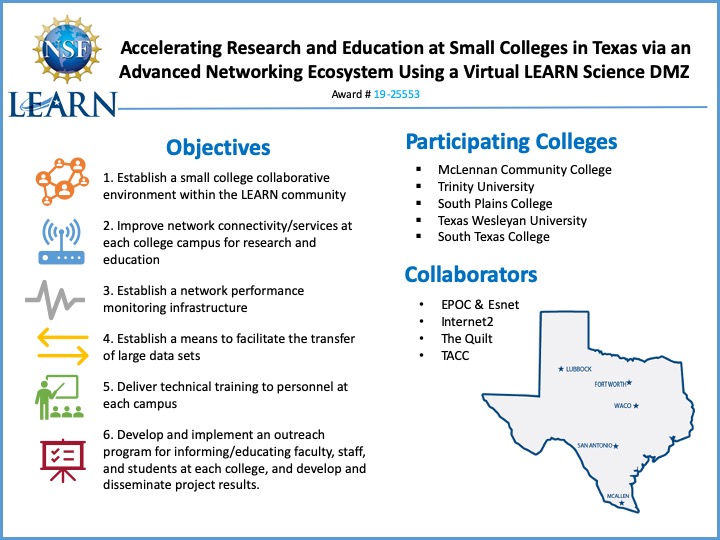In September 2019, LEARN was awarded its first National Science Foundation (NSF) grant as a lead organization – a two-year, $800,000 CC* Regional award titled: Accelerating Research and Education at Small Colleges in Texas via an Advanced Networking Ecosystem Using a Virtual LEARN Science DMZ (award number: 19-25553). The grant helps LEARN develop a program for regional network connectivity for smaller colleges and universities in Texas.
The initial set of five diverse colleges – McLennan Community College, South Plains College, South Texas College, Texas Wesleyan University, and Trinity University – have unique needs and programmatic foci, but many shared goals that can be addressed by faster, more advanced network infrastructure and access to high-performance computing. Through partnerships with the Texas Advanced Computing Center (TACC) at the University of Texas at Austin, Internet2, The Quilt, and the Engagement and Performance Operations Center (EPOC), LEARN hopes the project can be extended more broadly to other R&E networks across the United States and to the smaller campuses in their regions.
“We wholeheartedly embrace the theme of this project,” said Dan Stanzione, associate vice president for research at the University of Texas at Austin and executive director of TACC. “LEARN, as a regional cyberinfrastructure (CI) organization in the southern U.S., can and should play a substantial role in expanding utilization and access to research and education Cl to less resourced colleges and universities.”
“This is a big technological leap forward for South Plains College – aside from this being our first NSF grant, we will now have access to resources and training that has not been available in the past,” said Ryan Fitzgerald, co-principal investigator for this grant and dean of Dual Enrollment and Distance Education at South Plains College. “As a large, rural community college, this grant will allow our institution to provide the same network connectivity that large universities provide their students and staff.”
A primary objective of this project is to develop a CI-enabled community of small colleges to foster the growth of research and research-related education and training in institutions where there have been historical limitations. The outcomes of this collaboration will be faster, more efficient uptake of technologies, deployment of services needed to support excellence in teaching and research in the classroom, professional development of faculty and IT staff.
“Being able to partner with LEARN and have access to their expertise is a force multiplier for us,” said Jim Bradley, co-principal investigator for this grant and CIO at Trinity University. “This program will allow our researchers to access advanced computational services at scale without requiring us and many other smaller universities to replicate expensive local infrastructure. This serves everyone in Texas well and creates a great model for the country.”

